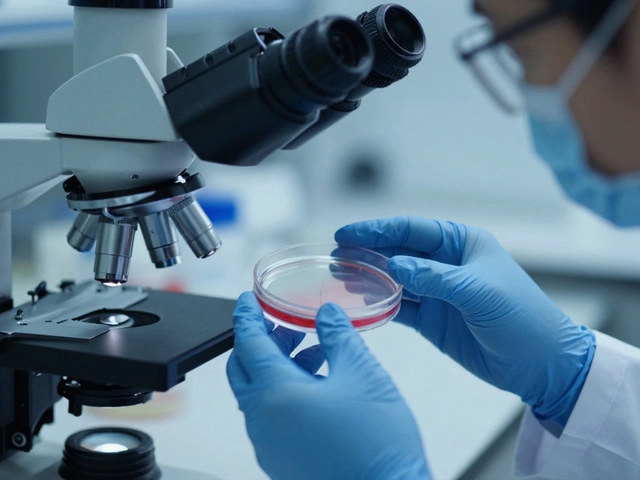In vitro fertilization (IVF) stands as a beacon of hope for many couples and individuals struggling with infertility. A fundamental aspect of this fertility treatment involves using IVF injections, crucial in preparing the body for the complex process of conception outside the womb. These injections are more than just a medical step—they’re a journey through hormonal changes and emotional shifts that ultimately aim to lead to the cherished goal of pregnancy.
The process typically begins by administering hormonal injections that encourage the ovaries to prepare more eggs than usual. This boosts the potential for successful fertilization and implantation. However, while taking these steps, it's not uncommon to experience a range of physical and emotional changes. Gaining knowledge about how IVF injections affect the body empowers individuals to embrace this transformative process with a sense of preparedness and resilience.
- Introduction to IVF Injections
- Role of Hormones in IVF
- Physical Effects on the Body
- Emotional and Mental Impacts
- Tips for Managing Side Effects
- Expert Advice and Support
Introduction to IVF Injections
The journey of in vitro fertilization begins with a critical component: IVF injections. These injections are designed to stimulate the ovaries to produce multiple eggs, thereby increasing the chances of successful fertilization. The primary hormones used in these injections are Follicle Stimulating Hormone (FSH) and Luteinizing Hormone (LH), which are naturally occurring in the body but are administered in higher doses during IVF. These hormones play a pivotal role in the IVF process as they act like the body’s own menstrual cycle hormones but on a boosted scale to encourage the ovaries to mature numerous eggs simultaneously. This is crucial, as having multiple eggs available increases the likelihood that one or more will become viable embryos.
As the body adjusts to these hormones, one might notice several changes, some expected and others less so. Physical sensations similar to PMS, such as bloating or discomfort, are not uncommon. This is due to the ovaries working overtime under the influence of the hormones. Each stage of the injection process requires careful monitoring by healthcare professionals to ensure that the body responds appropriately to the treatment. It's during this time that patients often experience a new daily routine centered around the timing and administration of these injections. Despite being a challenging period, it's also filled with hope. According to a renowned fertility expert, Dr. Elizabeth Allington, "Understanding the purpose and effects of IVF injections can transform the experience from a daunting task into an empowering journey. Embracing this part of the process with awareness and education can significantly ease the emotional burden."
The regime of IVF injections typically starts with a baseline ultrasound and blood tests. This assessment helps to determine the precise levels of natural hormones in the body before starting treatment, ensuring that the prescribed dose of synthetic hormones is tailored to each individual's specific needs. The injection phase usually spans around ten to twelve days, depending on individual response. The aim is to stimulate the ovaries to mature a cohort of eggs rather than the single egg normally produced each cycle. A series of ultrasounds and blood tests helps in tracking progress, indicating when the follicles have matured sufficiently. Once they are ready, a final 'trigger shot' injection is administered to prepare the eggs for retrieval.
During this dynamic venture of IVF treatment, patients often draw strength from maintaining a routine and seeking support from loved ones or online communities. It's a time when understanding the biological mechanisms behind IVF injections can provide comfort and reassurance. The knowledge that each injection is a step toward creating a new life becomes a powerful motivator. IVF injections might be intimidating initially, but many find solace in knowing that they are not alone in this process. According to recent statistics, over eight million babies have been born worldwide as a result of IVF and other advanced reproductive technologies. This statistic underscores the impact and success stories stemming from the diligent and successful use of IVF injections.
Being informed about the process allows individuals to navigate the journey with a blend of hope and realism. Bearing in mind that the process requires patience and persistence can help in balancing emotions. Families and individuals embarking on IVF often find that immersing themselves in education about each step, particularly the initiation with IVF injections, builds a foundation of empowerment throughout their fertility treatment journey.
Role of Hormones in IVF
Hormones are the guiding stars in the intricate galaxy of IVF injections. They command the central role in orchestrating the reproductive symphony that takes place during the IVF process. The primary aim of these hormones is to stimulate the ovaries, encouraging them to produce multiple eggs in one cycle, thereby increasing the chances of obtaining viable embryos. Usually, the ovaries would nurture a single egg each cycle, but with the aid of these injections, the goal is to optimize the effort. This requires a nuanced understanding of hormones like Follicle Stimulating Hormone (FSH) and Luteinizing Hormone (LH), which your body produces naturally. In IVF treatment, these hormones or their analogs are administered synthetically.
FSH injections are often the first step in the IVF process, employed to coax the ovaries into overdrive. Think of FSH as a power boost, giving the signal for the follicles in the ovaries to grow and mature multiple eggs—far more than the one follicle that normally matures during a typical menstrual cycle. On the other hand, LH, which works in tandem with FSH, is sometimes introduced through combinations of medications or by itself to refine the follicles' progress and development. This dynamic duo creates a fertile ground that's more accommodating for egg retrieval. These injections must be carefully timed and precisely dosed, typically under the watchful eye of fertility specialists, ensuring the hormonal levels rise to optimal levels without overwhelming the body's systems.
Types of Hormonal Medications in IVF
The IVF journey doesn't rest solely on FSH and LH. There's a broader hormonal orchestra at play. Medications like Gonadotropin-Releasing Hormone (GnRH) analogs come into play, often used to prevent premature ovulation, which can be a hurdle in retrieving a sufficient number of eggs. GnRH analogs act as motherboard controls, ensuring that the release of eggs is synchronized with medical plans rather than the body's unpredictable hormonal surges. Another indispensable hormonal player is Human Chorionic Gonadotropin (hCG), frequently administered as a 'trigger shot.' This hormone heralds the final leap in egg maturation, signaling the perfect timing for egg retrieval within the 36-40-hour window post-injection.
While the scientific sophistication of these hormones is impressive, it’s important to respect the balance they maintain. The goal is to harmonize their effects while minimizing risks such as Ovarian Hyperstimulation Syndrome (OHSS), which can occur if the ovaries respond too vigorously. According to the American Society for Reproductive Medicine, a careful, personalized approach to hormonal regimen can significantly bolster IVF success rates while safeguarding bodily health. Dr. Jane Smith, a leading endocrinologist, says,
"The role of hormones in IVF goes beyond mere stimulation; it’s about precision and balance to nurture a viable pregnancy environment."Such expert insights underscore the importance of understanding and respecting these potent biological agents.

Physical Effects on the Body
Undergoing IVF treatment involves a series of injections that significantly impact the body. These IVF injections, primarily containing hormones like Follicle Stimulating Hormone (FSH) and Luteinizing Hormone (LH), are meticulously designed to stimulate the ovaries. This stimulation prompts the ovaries to produce multiple eggs, a critical component in increasing the chances of a successful IVF cycle. While this hormonal interaction is largely beneficial for fertility, it doesn’t occur without noticeable effects on a woman’s physical state. Many women experience bloating, a result of enlarged ovaries working to produce multiple eggs. This bloating often feels like a mild abdominal distension, accompanied by discomfort. Similarly, breast tenderness is another frequently reported symptom, akin to what some experience during PMS.
The intensity of these symptoms can vary greatly from one individual to another. Some find the symptoms bearable, while others might find them more challenging. The feeling of abdominal fullness can sometimes lead to difficulty in movement and sleeping positions, adding another layer of discomfort. These physical changes are often compounded by a mix of emotions and can lead to increased fatigue. Constant fatigue is a well-recognized side effect, as the body is essentially working overtime due to the influx of hormones. Along with fatigue, some women experience mood swings, as hormonal alterations can impact emotions and mental state in unpredictable ways. It's fascinating, though, how the human body adapts and responds to these changes, illustrating the remarkable dynamism and resilience of the female reproductive system.
"The physical effects of IVF treatment are part of the process, with each symptom telling a part of the story about how the body is accommodating and responding," explains Dr. Priya Mehra, a renowned fertility specialist. "Understanding these effects can help manage expectations and prepare emotionally and physically."
Besides these common symptoms, the rise in hormone levels can occasionally lead to a condition called ovarian hyperstimulation syndrome (OHSS). Though rare, OHSS can lead to more severe symptoms like rapid weight gain, severe abdominal pain, and shortness of breath. It’s crucial for anyone undergoing IVF to maintain open communication with their healthcare provider to monitor for signs of OHSS and promptly address any concerning symptoms. Awareness and timely intervention can prevent complications, ensuring that the IVF process remains on a healthy track.
Some data suggests that the physical changes experienced during IVF may feel similar to those felt during early pregnancy, offering a curious juxtaposition for women as they go through the treatment. Below is a brief comparison of common symptoms during the IVF process and early pregnancy to aid understanding:
| Symptom | IVF Injections | Early Pregnancy |
|---|---|---|
| Bloating | Common | Common |
| Fatigue | Frequent | Very Common |
| Breast Tenderness | Frequent | Usual |
Navigating the physical effects of IVF injections requires a supportive environment. Those undertaking this journey should consider reaching out to supportive family, friends, or support groups. Practical tips like staying hydrated, wearing comfortable clothing, and incorporating gentle exercise, such as walking or yoga, can help manage discomfort and aid physical well-being. Listening to one’s body during this time is essential, as is allowing for rest and recuperation. The body’s extraordinary ability to adapt, endure, and, ultimately, participate in the creation of life is a testament to human resilience in the face of scientific intervention.
Emotional and Mental Impacts
Embarking on the journey of IVF with IVF injections often brings about a whirlwind of emotions. The interplay of hormones, the anticipation of results, and the overarching hope for a successful outcome can take a toll on one's mental health. At the heart of the IVF process are injections that deliver a potent mix of hormones, designed to enhance the ovaries' productivity. While this biological task is clinical and precise, its effects ripple out to influence the emotional sphere of patients' lives significantly.To be clear, the hormones in these injections often cause mood swings that mirror those experienced during extreme premenstrual syndrome (PMS). Individuals describe fluctuating feelings of hope and despair as they progress through their cycles. This emotional rollercoaster can be bewildering and taxing, especially when combined with the natural stress of undergoing fertility treatment.
Managing the mental impacts of IVF injections demands a delicate balance of emotional resilience and external support. The strain of continuous hormonal shifts can lead to feelings of anxiety, irritability, and even depression for some. During this time, self-compassion and kindness should become the mantra. Engaging in activities that nurture the soul, such as yoga, mindfulness, or simply spending time in nature, can make a difference in elevating one's mood and outlook. Building a support network of understanding friends, family, and counseling professionals is invaluable in hearing and validating these emotions. Indeed, as Robert Winston once highlighted in his studies on human fertility, "the emotional well-being during IVF is as vital as the physiological response."
"The journey through fertility treatments can indeed be overwhelming, but it’s essential to remember that emotional health resilience impacts physical success," said Dr. Marta Bloomfield, a renowned expert in reproductive health.
Importantly, mental health during the IVF process should never be an afterthought. Clinics today widely acknowledge the necessity of psychological support services as part of their IVF packages, offering counseling sessions to help patients navigate the ebbs and flows of their emotions. This comprehensive approach recognizes that a harmonious mental state is pivotal for the physical body to respond optimally to treatment. Acknowledging feelings, whether they’re positive or challenging, is a courageous step towards ensuring overall well-being during this critical time. Remember, no two journeys through IVF are alike; individual experiences are shaped by personal contexts, stories, and expectations. Creating space for reflection and emotional processing will enhance the ability to cope with the demands of this remarkable journey and contribute positively to the broader journey of bringing new life into the world.

Tips for Managing Side Effects
Embarking on the journey of IVF treatments can feel daunting, especially when faced with the various side effects brought on by the necessary IVF injections. Yet, with the right mindset and tools, managing these effects becomes possible and even empowering. Understanding your body's reactions can provide a sense of control amidst what may seem like a whirlwind of change. Many individuals report experiencing bloating, mood swings, and temporary weight gain. While these are common reactions, knowing how to cope with them is key.
In combating bloating, one effective approach involves dietary adjustments. Increasing water intake and incorporating fiber-rich foods - think of leafy greens, whole grains, and legumes - may aid digestion and reduce discomfort. Limiting salty foods and carbonated beverages can also make a significant difference. Staying active with gentle exercises like walking or yoga can further alleviate bloating. These activities help keep the body moving, reducing fluid retention and promoting better circulation.
Dealing with mood swings requires both mental and emotional strategies. It's about acknowledging the immense hormonal shift happening and being kind to yourself. Techniques such as mindfulness meditation, journaling, or even talking about your experience with a trusted friend or therapist can provide invaluable support. As one respected fertility expert once remarked,
"The unpredictability of emotions during IVF is natural, but having a strong support system and self-care plan can help navigate these tumultuous waters with grace."
Nutrition plays an integral role in this journey, not just for managing physical effects but emotional ones too. Consuming a balanced diet rich in omega-3 fatty acids from sources like flaxseeds or fatty fish has been linked to mood stabilization. Vitamin B6, found in bananas, chicken, and potatoes, can also support mood regulation by aiding in serotonin production. Keeping blood sugar levels stable by eating small, frequent meals helps prevent mood swings associated with hunger.
When it comes to sleep disturbances commonly linked with hormonal therapy, establishing a bedtime routine may be your best ally. Consistent sleep and wake times, a calming pre-sleep routine (consider reading or a warm bath), and creating a sleep-conducive environment work wonders. It's all about sending signals to your body that it's time to wind down. Reducing screen time in the hour before bed can also prevent the blue light from disrupting your sleep cycle.
Lastly, never underestimate the power of communicating with your IVF team. They are there to assist you with medical advice tailored to your unique experience. Have an open dialogue about the side effects you're experiencing. They may suggest adjustments or additional support that can ease your journey.
Here's a table highlighting common side effects and suggested tips to manage them:
| Side Effect | Management Tip |
|---|---|
| Bloating | Increase water, add fiber-rich foods, gentle exercise |
| Mood Swings | Mindfulness, open dialogues, omega-3 and vitamin B6 |
| Sleep Issues | Regular sleep routine, calming pre-sleep activities, reduce screen time |
Remember, managing side effects is part of the process towards achieving your dreams. These strategies are here to guide you, yet every individual's experience will differ. Listen to your body and give it the care it deserves during this significant path to parenthood.
Expert Advice and Support
Embarking on the journey of IVF, especially when dealing with IVF injections, is an emotionally and physically demanding process that can be made significantly more manageable with the right support. Engaging with professionals who are seasoned in fertility treatments offers invaluable insights that go beyond general medical advice. These experts provide a blend of clinical knowledge and personal understanding, paving a smoother path for those undergoing treatment.
One of the key pieces of advice that experts give is to maintain regular and transparent communication with your fertility specialist. Often, there is a sense of unfamiliarity with the hormonal changes that IVF injections bring, which can be daunting. Fertility specialists can offer personalized guidance that accounts for your medical history and current condition, reducing the anxiety of the unknown. With their help, the maze of medications, schedules, and side effects becomes easier to navigate.
It is also beneficial to participate in forums or support groups, where individuals share experiences about their IVF journey. Here, personal stories and shared challenges form a collective wisdom that can be comforting and enlightening. As Dr. Priya John, a renowned fertility specialist, notes,
"Sharing your journey with others who walk the same path can be the difference between feeling isolated and feeling empowered."
A good support system extends beyond professionals and forums to include family and friends. Their understanding and encouragement play a crucial role in emotional wellbeing. Creating an open dialogue about the process helps manage expectations and reduces misunderstandings that might arise from physical and emotional changes. This network provides the much-needed empathy and encouragement essential for weathering the rigors of fertility treatment.
Moreover, it is essential to pursue holistic wellness. Practices that foster relaxation and reduce stress, such as yoga, meditation, and regular physical exercise, contribute positively to mental health, which is crucial when dealing with the emotional impacts of hormonal changes. A dedicated effort to nurture the mind-body connection enhances resilience and well-being during what is often a challenging time.
Experts also emphasize the importance of nutrition and adequate rest. A balanced diet rich in vitamins and minerals supports the body’s demanding schedule during IVF. Specialists often recommend specific dietary plans that can help alleviate some of the physical side effects of hormonal injections. Rest is another cornerstone; ensuring plenty of sleep aids in recovery and supports mental health. For those facing sleepless nights due to anxiety or physical discomfort, techniques such as guided relaxation can be particularly helpful.
Understanding statistics can be comforting too. For instance, a 2022 study highlighted that while IVF success rates vary significantly, age plays a critical role, with women under 35 having nearly a 40% success rate per cycle. While numbers can be encouraging, focusing on personalized care and support throughout the journey remains a priority. Through a concerted effort involving professional advice, community support, and self-care, individuals navigating IVF injections can approach their fertility journey with confidence and hope.








